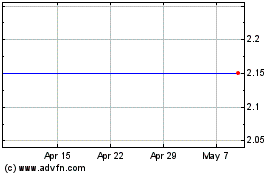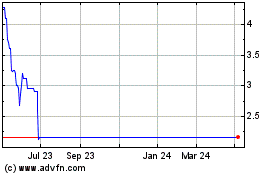TIDMGRL
RNS Number : 7176A
Goldstone Resources Ltd
27 September 2022
27 September 2022
GOLDSTONE RESOURCES LIMITED
("GoldStone" or the "Company")
Update on Diamond Drilling at Akrokeri, Ghana
GoldStone Resources Limited (AIM: GRL), the emerging gold
producer and developer focused on Ghana, is pleased to provide the
assays from the first three holes of the Diamond Drilling ("DD " )
programme, announced 30 August 2022. These holes are the first in a
programme designed to probe the southward extension of the
high-grade orebody exploited in the Akrokeri mine ("Akrokeri Mine"
or "Mine") down to a depth of around. 70 m vertical, and along
initial strike distance of around 600 m. The drill programme is in
line with the Company's strategy to advance additional
high-priority gold targets towards production to augment current
production from the Company's Homase Open Pit Mine.
Highlights
-- Results for the three diamond drill-holes have returned very
encouraging results, including:
- 22AKDD001: 6.5 metres @ 1.63g/t from 7.7 metres, including 3.5
metres @ 2.35g/t
- 22AKDD002: 4.1metres @ 11.01g/t from 46 metres, including
1metre @ 41.04g/t
- 22AKDD003: 3.6 metres @ 5.77g/t from 69.4 metres, including
1metre @ 12.06g/t
-- The drilling confirmed continuity of the mineralised zone at
vertical depths of between 36 metres and 65 metres and extending a
minimum of 180 m beyond the known southern limit of the mine
-- These results and the ongoing drill programme underpin
GoldStone's focus on delineating near-surface resources that can be
exploited in the near future
Emma Priestley, CEO of Goldstone, commented:
"The ramp up of gold production at Homase is gaining momentum,
and we are now increasingly contemplating our longer-term
production profile. A key feature of this expansion plan is the
delineation of potentially high-grade resources along strike and
down dip of the Akrokeri orebody. Historically, the Akrokeri Mine
yielded 75,000 oz gold at an average grade of 24 g/t and, more
recently, has returned some exceptional results from exploration
activities.
"The first three holes of this drilling programme at Akrokeri
have delivered significant intersections and confirmed the
continuity of the mineralised zone for a minimum distance of 180 m
southwards from the known limit of the former Akrokeri Mine
workings. These initial results have confirmed the nature and
overall geometry of a structurally controlled mineralised channel
and allow planning of the continuing drill programme with a high
degree of confidence. Although the evidence from the old Akrokeri
Mine indicates that the orebody should extend to a vertical depth
of around 150m, our focus will be on identifying relatively
near-surface resources that can be exploited in the foreseeable
future."
Further Details
The drilling results shows mineralisation extends along strike,
displays the vein widths and also demonstrates the extent of the
former underground workings. Mineralisation intersected in this
drilling is consistent with projections of the drilling campaigns,
previously started by Birim Gold Plc in 1996, and Pan African
Resources Plc in 2007. The Company relogged the core from these
former campaigns, announced 7 June 2018. The assaying of the core
identified mineralised zones, which are basis for this current
drilling campaign.
The first three-holes from the 1,500 metre diamond drill
programme, totalling 268.1 metres, were designed to provide new
information on the depth and strike-continuity of the mineralised
zone at the former Akrokeri Mine previously exploited between 1905
and 1909.
The steeply west-dipping mineralised zone occupies a major
North-South-trending structural corridor 12 km north-north-east
(NNE) of the multiple ore zones that comprise the Obuasi Mine, one
of the world's largest gold mines with a combined historical and
current production and resource base of >70 million ounces of
gold.
Two of the three holes were inclined at 55(o) and one at 75(o)
respectively and intersected the mineralised zone at vertical
depths between 37 m and 66 m beneath surface. All three holes
intersected significant widths of approximately 2.2 metres
mineralisation, thus confirming the continuity of the zone along
strike and with depth.
The mineralised intercepts in the three DD holes are
characterised by quartz and quartz carbonate veinlets. In the
intervals reported with significant intercepts, much of the
mineralisation is oxidized, transitioning through patchy weathering
with low pyrite content and quartz being the dominate vein
component.
Figure. 1. Location of the three diamond drillholes at
Akrokeri
Significant intersections are summarised in Table 1. The diamond
drill holes were collared in the hangingwall.
Table 1. 2022 Diamond drilling significant intersections
Hole_ID Hole Hole Interval Weighted Intersection Calculated true
Depth Depth length average (metres g/t) width of the intersection
from to (metres) (metres) grade (metres):
(metres) g/t ore body dip
75 (o)
dip direction
270 (o)
Quartz vein in artisanal
Trench workings 3m @ 45.1 g/t 3m
------------------------------------------------ -------------------- ---------------------------
6.5m @ 1.63
g/t, Including
3.5m @ 2.35
22AKDD001 7.7 14.2 6.5 1.63 g/t 4m
----------- ---------- ------------- ---------- --------- -------------------- ---------------------------
21.7 26.1 4.4 - Void - old workings 2.7m void
----------- ---------- ------------- ---------- --------- -------------------- ---------------------------
69.7 70.8 1.1 - Void - old workings 0.87m void
----------- ---------- ------------- ---------- --------- -------------------- ---------------------------
4.4m @ 1.09
22AKDD002 0 4.4 4.4 1.085 g/t -
----------- ---------- ------------- ---------- --------- -------------------- ---------------------------
4.1m @ 11.01
g/t, including
46 50.1 4.1 11.01 1m @ 41.04 g/t 3.14m
----------- ---------- ------------- ---------- --------- -------------------- ---------------------------
3.9m @ 1.74
22AKDD003 0 3.9 3.9 1.74 g/t -
----------- ---------- ------------- ---------- --------- -------------------- ---------------------------
3.6m @ 5.77
g/t, including
69.4 73 3.6 4.36 1m @ 12.06 g/t 1.2m
----------- ---------- ------------- ---------- --------- -------------------- ---------------------------
22AKDD001 intersected the old workings at vertical depths of
around 18 metres and 59 metres. The shallower void was 2.7 metres
wide, being along strike from the known workings of the Akrokeri
Mine. Whilst it is disappointing that the former miners have mined
this section of the mineral zone, it proves the extension of the
mine workings along the first level that was previously recorded as
being 100 feet vertical depth, approximately 30 metres below
surface, noting that some 12m of ground has been worked and dugout
since that time with over 100 years of artisanal mining on the
Akrokeri Mine area.
The location of 22AKDD001 is opposite the artisanal miners'
trench that was announced 25 March 2022. The assays from the trench
returned relatively high-grade central zone of 3 metres with an
average grade of 45g/t, the location of the trench appears to
correlate with the down-dip projection of the mineralised zone,
which again unfortunately has been mined out by the former
miners.
22AKDD002 and 22AKDD003 intersected the mineralised zone at
approximately 180 metres along strike from the known workings of
the Akrokeri Mine. The intersections can be correlated to an
intercept within hole PAR007 which was drilled in 2007. Further
intercepts encountered in this hole indicate the possibility of
sub- parallel structures in addition to the main vein.
The results from the first three holes drilled in 2022 provide
significant encouragement to undertake additional drilling along
the projected extension of the mineralised zone, as a detailed
understanding of the controls of this zone at Akrokeri is critical
to the planning of further exploration drilling.
The old mine's average grade of 24g/t indicates a nuggety
deposit. The preliminary results received so far suggest this
mineralisation pattern continues along strike outside the former
mine's boundaries.
It also suggests any extension of the mineralised zone, both on
strike and on dip, may be of above average grade. This justifies
expanding the drilling program beyond the scope of the current
program.
Sampling, assaying, and QA/QC
GoldStone's sampling of drill core, and other geological
materials conforms to industry-wide good practise. The Company
maintains QA/QC on all analytical work via the use of certified
reference materials, field duplicates, and blank samples in
addition to monitoring of internal laboratory check-analyses. Chain
of custody is observed for all samples. Determination of gold, by
fire assay of 50g sub-samples and atomic absorption finish, was
undertaken by Intertek Minerals Ltd in Tarkwa, Ghana.
Competent Person's Statement
The technical information within this announcement has been
reviewed and approved by Klaus Kappenschneider, an independent
geologist with 30 years' experience in gold mining, exploration and
resource estimation. Klaus is a member of the Association of
Professional Geoscientist of Ontario (APGO), is a Competent Person
(JORC, SAMREC, PEMREC) and a Qualified Person (NI 43- 101) and
accordingly, is a qualified person as required under the AIM
Rules.
For further information, please contact:
GoldStone Resources Limited
Bill Trew / Emma Priestley Tel: +44 (0)1534 487 757
Strand Hanson Limited
James Dance / James Bellman Tel: +44 (0)20 7409 3494
S. P. Angel Corporate Finance
LLP
Ewan Leggat / Charlie Bouverat Tel: +44 (0)20 3470 0501
St Brides Partners Ltd Tel: +44 (0)20 7236 1177
Susie Geliher / Max Bennett
About GoldStone Resources Limited
GoldStone Resources Limited (AIM: GRL) is an AIM quoted mining
and development company with projects in Ghana that range from
grassroots exploration to production.
The Company is focused on developing the Akrokeri-Homase project
in south-western Ghana, which hosts a JORC Code compliant 602,000oz
gold resource at an average grade of 1.77 g/t. The existing
resource is confined to a 4km zone of the Homase Trend, including
Homase North, Homase Pit and Homase South.
The project hosts two former mines, the Akrokerri Ashanti Mine
Ltd, which produced 75,000 oz gold at 24 g/t recovered grade in the
early 1900s, and the Homase Pit which AngloGold Ashanti developed
in 2002/03 producing 52,000 oz gold at 2.5 g/t recovered.
Production is currently focussed on the Homase Mine however it is
the Company's intention to build a portfolio of high-quality gold
projects in Ghana, with a particular focus on the highly
prospective Ashanti Gold Belt.
This information is provided by RNS, the news service of the
London Stock Exchange. RNS is approved by the Financial Conduct
Authority to act as a Primary Information Provider in the United
Kingdom. Terms and conditions relating to the use and distribution
of this information may apply. For further information, please
contact rns@lseg.com or visit www.rns.com.
RNS may use your IP address to confirm compliance with the terms
and conditions, to analyse how you engage with the information
contained in this communication, and to share such analysis on an
anonymised basis with others as part of our commercial services.
For further information about how RNS and the London Stock Exchange
use the personal data you provide us, please see our Privacy
Policy.
END
UPDFFFFLAAIRFIF
(END) Dow Jones Newswires
September 27, 2022 02:01 ET (06:01 GMT)
Goldstone Resources (LSE:GRL)
Historical Stock Chart
From Mar 2024 to Apr 2024

Goldstone Resources (LSE:GRL)
Historical Stock Chart
From Apr 2023 to Apr 2024
